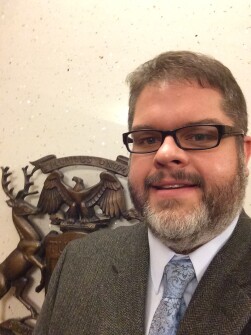My friend , whose blog, is one of my must-reads, raised this issue earlier. I was intrigued--was this a loophole for the who want to opt their children out of excessive and harmful testing? Nick offered this clarification:
THE TYPOGRAPHICAL ERROR:
President Barack Obama signed the Every Student Succeeds Act (“ESSA”) into law on December 10, 2015, replacing the No Child Left Behind Act of 2001 (“NCLBA”).

Under the ESSA, states must test public school students in mathematics and reading every year in grades 3 through 8, and at least once during high school. It has been widely reported that the ESSA mandates 95% participation by pupils on these required state tests. But does it really?
The section that purports to establish the 95% participation requirement, § 1111(c)(4)(E)(i), contains a typographical error. It provides that each state must "[a]nnually measure the achievement of not less than 95 percent of all students, and 95 percent of all students in each subgroup of students . . . on the assessments described under subsection (b)(2)(v)(I).”
So what’s the problem? Well, there are no “assessments described under subsection (b)(2)(v)(I).” That’s because “subsection (b)(2)(v)(I)” doesn’t exist.
Congress almost certainly meant to say “subsection (b)(2)(B)(v)(I).” After all, this is the subsection that mandates the administration of mathematics and reading assessments each year in grades 3 through 8, and once in grades 9 through 12. But that’s not what the plain language of the statute actually states. And as Chief Justice John Roberts has reminded us, “the best evidence of Congress’s intent is the statutory text."*
So, while the ESSA unquestionably requires the states to administer yearly assessments in mathematics and reading, it does not actually require 95% student participation on those tests. Instead, as currently written, it requires 95% student participation on some other, completely different set of nonexistent assessments.
Congress might want to consider hiring a few more proofreaders.
EXCEEDING STATUTORY AUTHORITY:
Despite this typographical error, let’s assume that the 95% participation mandate is valid.
One of the major differences between the ESSA and the NCLBA is that the ESSA eliminates several federally mandated corrective measures and school intervention strategies, and returns significant control over the improvement of low-achieving schools to state and local education agencies. To this end, § 1111(e)(1)(B)(iii)(XI) of the ESSA expressly prohibits the Secretary of Education from promulgating any rules that prescribe the manner in which the states take into account and enforce the 95% participation mandate.
In spite of this statutory prohibition, Secretary of Education John B. King, Jr. has announced several proposed amendments to 34 C.F.R. § 200.15 that would (1) order the states to comply with the 95% participation mandate in a uniform manner, (2) require each state to implement one of several punitive reform measures for any school that fails to comply with the 95% participation mandate, and (3) direct any school that does not meet the 95% mandate to adopt an “improvement plan."**
Secretary King’s proposed amendments to Regulation § 200.15 plainly violate the intent of Congress as unambiguously expressed in the statute. Will anyone step forward to stop the Department of Education from promulgating these illegal rules? Only time will tell.
WHY IT MATTERS:
The ESSA explicitly recognizes the right of parents to opt their children out of state standardized assessments if authorized by state or local law. In particular, § 1111(b)(2)(K) provides that "[n]othing in this paragraph shall be construed as preempting a State or local law regarding the decision of a parent to not have the parent’s child participate in the academic assessments under this paragraph.”
Secretary King is a known proponent of high-stakes standardized testing. Indeed, during his tenure as New York State Education Commissioner, King’s onerous testing policies led to one of the largest parental opt-out movements in the country.
King has already tipped his hand by proposing new regulations that would punish public schools for failing to test enough of their students. Looking forward, it seems likely that the Department of Education will argue that parental opt-outs violate the 95% participation mandate in § 1111(c)(4)(E)(i) and King’s proposed amendments to Regulation § 200.15.
If and when the federal government begins making such arguments, it will be important for parents and educators to remember that Congress expressly left choices concerning parental opt-outs and enforcement of the 95% participation mandate to the individual states.
* NFIB v. Sibelius, 567 U.S. ___; 132 S.Ct. 2566, 2583; 183 L.Ed.2d 450 (2012).
** 81 Fed. Reg. 34540.